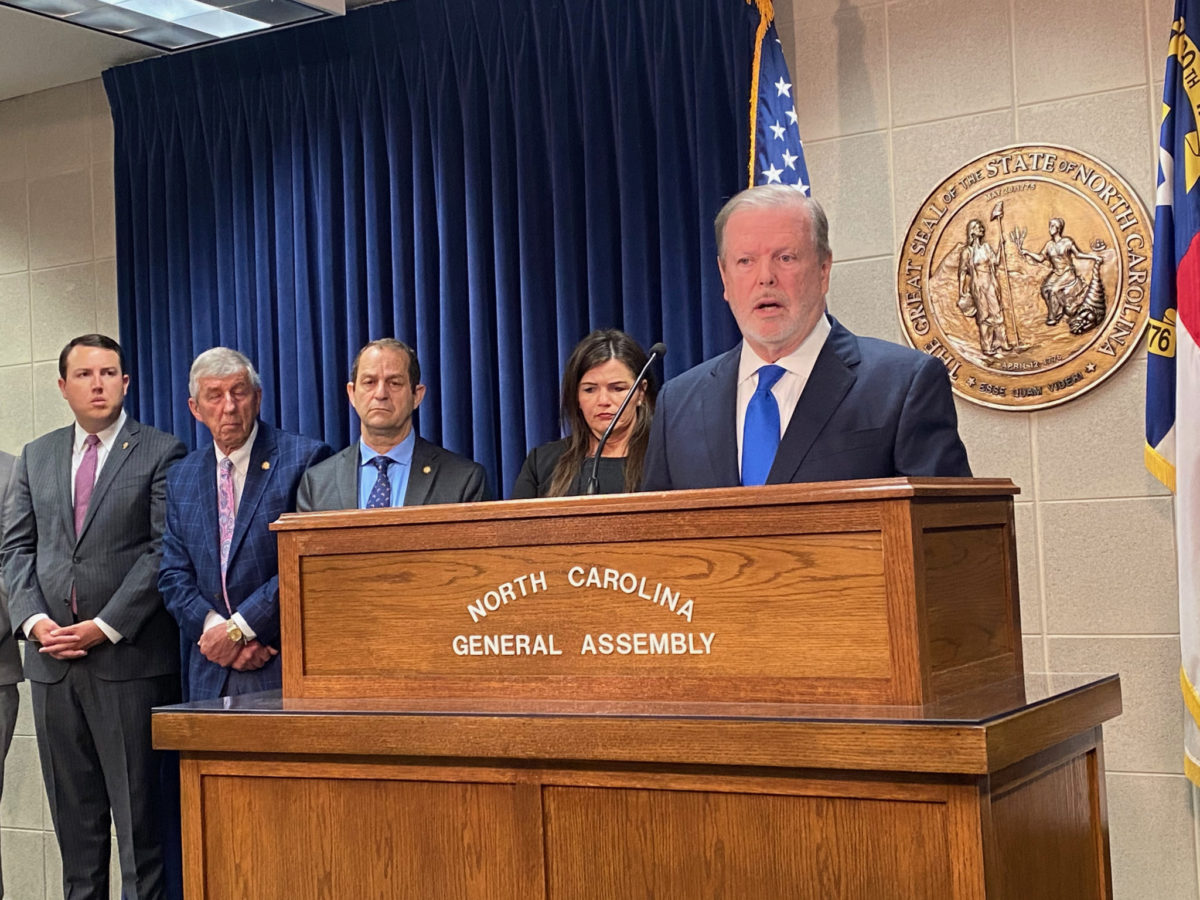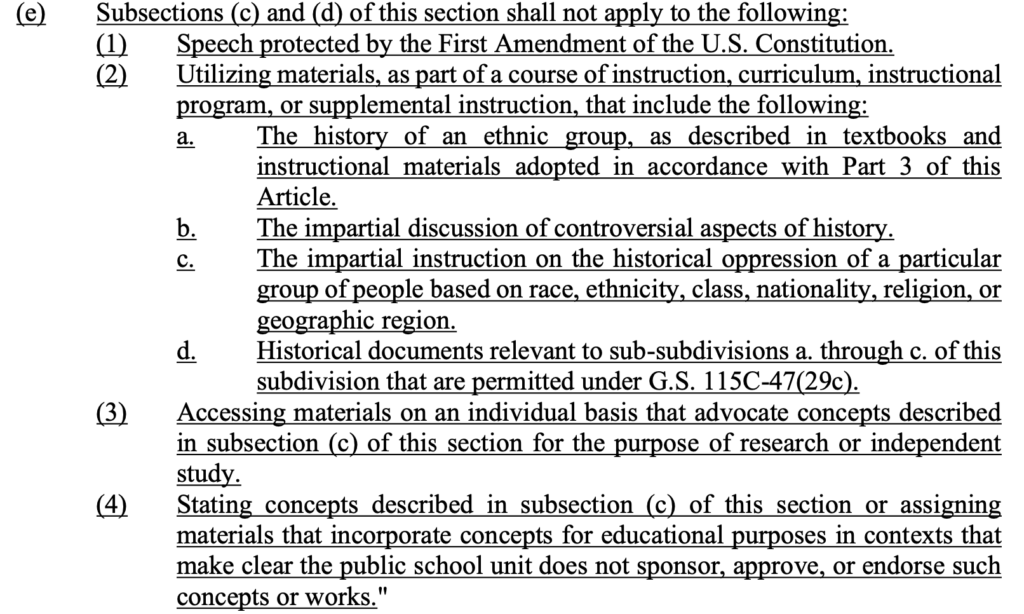

|
|
A Senate education committee took up a revised version of a bill that opponents say would prevent schools from having accurate discussions about the history of race and sex in the United States.
Democrats in the committee pushed back against the assertion by Republican leaders that the bill was simply trying to prevent “indoctrination,” saying it would instead stymie critical thinking and amounts to a “speech code.” Read about the committee discussion here.
HB 324 and its revision
The original House bill, entitled “Ensuring Dignity & Nondiscrimination/Schools,” included seven “concepts” that couldn’t be “promoted” in schools.
Those “concepts” were:
- “One race or sex is inherently superior to another race or sex.
- “An individual, solely by virtue of his or her race or sex, is inherently racist, sexist, or oppressive, whether consciously or unconsciously.
- “An individual should be discriminated against or receive adverse treatment solely or partly because of his or her race or sex.
- “An individual’s moral character is necessarily determined by his or her race or sex.
- “An individual, solely by virtue of his or her race or sex, bears responsibility for actions committed in the past by other members of the same race or sex.
- “Any individual, solely by virtue of his or her race or sex, should feel discomfort, guilt, anguish, or any other form of psychological distress.
- “The belief that the United States is a meritocracy is racist or sexist or was created by members of a particular race or sex to oppress members of another race or sex.”
That original bill, which passed the House, also defined “promote” in the following ways:
- “Compelling students, teachers, administrators, or other school employees to affirm or profess belief in the concepts described in subsection (c) of this section.
- “Including concepts described in subsection (c) of this section in curricula, reading lists, seminars, workshops, trainings, or other educational or professional settings in a manner that could reasonably give rise to the appearance of official sponsorship, approval, or endorsement.
- “Contracting with, hiring, or otherwise engaging speakers, consultants, diversity trainers, and other persons for the purpose of advocating concepts described in subsection (c) of this section.”
The new version of the bill heard in the Senate education committee added six more “concepts” to the list of those that can’t be promoted. They are:
- “The United States was created by members of a particular race or sex for the purpose of oppressing members of another race or sex.
- “The United States government should be violently overthrown.
- “Particular character traits, values, moral or ethical codes, privileges, or beliefs should be ascribed to a race or sex, or to an individual because of the individual’s race or sex.
- “The rule of law does not exist, but instead is a series of power relationships and struggles among racial or other groups.
- “All Americans are not created equal and are not endowed by their Creator with certain unalienable rights, including life, liberty, and the pursuit of happiness.
- “Governments should deny to any person within the government’s jurisdiction the equal protection of the law.”
The Senate bill also changes the definition of promote, which now “shall mean compelling students, teachers, administrators, or other school employees to affirm or profess belief in the concepts described in subsection (c) of this section.”
The bill was only up for discussion during the Senate committee today. During a press conference this morning, Senate President Pro Tem Phil Berger, R-Rockingham, said a vote would be taken later this session, though he didn’t specify a timetable for how quickly that might happen.
He spoke at length in the press conference from prepared remarks about the rise of “critical race theory” in the United States and the need to combat it.
“What do we do when confronted with a doctrine that ‘questions the very foundations of the liberal order’? That’s how leading legal scholars Richard Delgado and Jean Stefancic describe critical race theory, the school of thought they helped found,” he said in his prepared remarks.
Neither the House bill nor the Senate version of the bill mention critical race theory, and it’s not clear that they have anything to do with the theory. A CNN article quoted Kimberlé Crenshaw as describing critical race theory this way:
“Critical race theory is a practice. It’s an approach to grappling with a history of White supremacy that rejects the belief that what’s in the past is in the past, and that the laws and systems that grow from that past are detached from it.”
According to the article, Crenshaw is a founding critical race theorist and a law professor who teaches at UCLA and Columbia University.
In his remarks, Berger said that the bill “forbids public schools from promoting certain discriminatory concepts.”
The revised bill now also requires schools to make available to the public information at least 30 days prior to the following actions:
- “Providing instruction regarding concepts described in subsection (c) of this section in curricula, reading lists, seminars, workshops, trainings, or other educational or professional settings.
- “Contracting with, hiring, or otherwise engaging speakers, consultants, diversity trainers, and other persons for the purpose of discussing concepts described in subsection (c) of this section.
- “Contracting with, hiring, or otherwise engaging speakers, consultants, diversity trainers, and other persons who have previously advocated for the concepts described in subsection (c) of this section.”
The Senate version of the bill also includes more explicit language than the House version regarding what is still allowed under the legislation, as seen below.


Berger said the bill doesn’t have any enforcement mechanism or penalties for violating the provisions of the bill. He said instead that he thought “sunshine” was good for the state.
In addition to the revised Senate bill, Berger said lawmakers will consider putting a Constitutional amendment on the ballot next year, part of which states: “The State and its political subdivisions, including the free public schools and public institutions of higher education, shall not discriminate against, or grant preferential treatment to, any individual or group on the basis of race, sex, color, ethnicity, or national origin in the operation of public employment, public education, or public contracting.”
He was asked during the press conference whether that amendment would outlaw affirmative action. He said he didn’t know that for sure, but said the constitutional amendment is being modeled on amendments in California and Michigan.
He said in his prepared remarks that the purpose of the amendment is to affirm “our commitment to the principles of the Civil Rights Act.”
Committee discussion
Lt. Gov. Mark Robinson, a Republican, spoke after Berger presented the bill to the education committee today. Robinson began by asking the members of the committee to imagine that they were in elementary school and friends with someone of a different color. And then he asked them to imagine the teacher talking about “terrible things” in the past that have “created a system of injustice.”
“And now there’s an animosity between you and that friend because of the color of your skin,” he said. “If you think this can’t happen, it can.”
Robinson went on to to say that at school he learned about Jim Crow and all sorts of atrocities that happened in the past, but he was taught by teachers who didn’t have an agenda.
“That’s important,” he said. “It was without an agenda.”
Robinson created a task force to look into examples of indoctrination in schools and said that task force will be releasing some of its findings during the next week.
“It’s happening all across our state unfortunately,” he said.
But Democrats on the committee pushed back against both the bill and the assertions that indoctrination is happening in North Carolina schools.
“What are the instances in this state that are bringing us here today?” asked Rep. Don Davis, D-Pitt.
Robinson brought up a student who wanted to do an assignment about Robinson because he is an example of a person of color who has made history. Robinson is the first Black lieutenant governor in North Carolina. According to Robinson, the parent of the child said the student’s teacher wouldn’t allow Robinson to be the subject of the assignment.
Davis asked which part of the bill would have prevented that from happening. Robinson said he would have to look and see but said that politics was why that student wasn’t allowed to write about him.
Rep. Jay Chaudhuri, D-Wake, asked a number of hypothetical questions of Berger, including whether teaching about the history of redlining in the United States or a student doing an assignment arguing in favor of reparations would be forbidden under the bill. Berger said he didn’t believe so and said that the things people think are forbidden under this legislation are not actually a part of the legislation.
Chaudhuri said he believes the bill establishes a “speech code.”
“I fear that what it really does away with is critical thinking in the classroom,” he said.
Rep. Joyce Waddell, D-Mecklenburg, said the bill will limit student engagement with history and current events and will make it more difficult to tackle inequities in schools or the opportunity gap. She said that this bill will take the state further from nondiscrimination.
Berger said he did not expect the bill to come back before the committee for a vote within the next week. Rep. Michael Lee, R-New Hanover, a co-chair of the Senate education committee, said it will come up again “at some point in the not too distant future.” In his prepared remarks, Berger said the Senate is “considering open hearings to learn from both proponents and opponents of the doctrine.”
Asked during the press conference about the likelihood that Democratic Gov. Roy Cooper would veto this bill and that Democrats would uphold that veto, Berger said: “If the governor is in favor of saying that one sex or race is inherently superior to another race or sex, he can veto the bill.”





